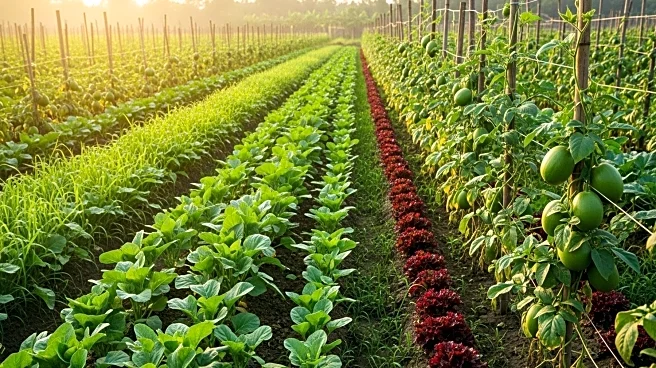What's Happening?
In the Sundarbans region of South 24 Parganas, women are leading efforts in organic farming to address soil salinity and enhance agricultural productivity. The area, known for its saline soil due to proximity to the Bay of Bengal, faces challenges in rice cultivation. Women farmers like Amrita Das are utilizing organic fertilizers made from composts such as cow dung and vermicompost to improve soil conditions. This approach not only prevents soil pollution but also reduces costs and maintains the nutritional quality of crops. The Development Research Communication and Service Center (DRCSC) provides training for these organic methods, including pest control, and government aids support the cultivation process. Despite frequent cyclones and natural disasters, which increase soil salinity, these women continue to cultivate rice varieties suited to the local conditions, contributing significantly to their household economies.
Why It's Important?
The shift towards organic farming in the Sundarbans is crucial for sustainable agriculture and environmental conservation. By reducing reliance on chemical fertilizers, these practices help preserve soil health and prevent pollution, ensuring long-term agricultural viability. Economically, this initiative empowers women, providing them with skills and resources to contribute to their families' incomes, especially in a region where traditional male-dominated labor has been disrupted by natural disasters. The focus on organic farming also aligns with global trends towards sustainable agriculture, potentially influencing broader agricultural policies and practices. This movement not only supports local food security but also offers a model for other regions facing similar environmental challenges.
What's Next?
The continued success of organic farming in the Sundarbans may lead to increased government support and investment in sustainable agricultural practices. As these women farmers demonstrate the viability of organic methods, there could be broader adoption across other regions with similar environmental conditions. Additionally, the development of local markets for organic produce could enhance economic opportunities, encouraging more farmers to transition to organic methods. The resilience shown by these communities in the face of natural disasters may also prompt further research and innovation in disaster management and agricultural recovery strategies.
Beyond the Headlines
The story of Sundarbans women in organic farming highlights the intersection of gender, environment, and economic resilience. It challenges traditional gender roles in agriculture, showcasing women's capacity to lead and innovate in sustainable practices. This development also raises questions about the long-term impacts of climate change on agriculture and the need for adaptive strategies. The cultural significance of rice cultivation in the region, combined with the economic necessity, underscores the importance of preserving traditional practices while integrating modern sustainable techniques.










